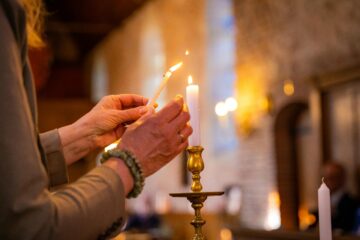Protopresbyter Themistoklis Mourtzanos
‘Now there is in Jerusalem by the Sheep Gate a pool, in Hebrew called Bethesda which has five porticoes. In these lay a multitude of invalids, blind, lame, paralyzed, waiting for the waters to be moved’.
One of the factors of human existence, which often constitutes a trap for us, is the need to overcome loneliness. We want self-affirmation and this is expressed by the number of people who follow us, who talk to us, who are with us, even if their feelings are no more than superficial. We see this today in the social media. But in the realm of institutions, such as politics, numbers also generate good impressions, as they do in art. The value of a work, however transient it may be, is clear from its popularity. In general, how far something resonates is what counts and is counted. The whole of the advertising industry has numbers as its focus.
And, often enough, quantity counts for us even in the spiritual dimension of our existence. On an institutional level, the position of the Church depends on the number of people who attend its services and other events, and on the appraisal of its charitable work, which ensures social acceptance because it’s useful. And certain persons are considered charismatic depending on how famous they are and, sometimes, on the armies of supporters who accompany them. When it’s a matter of life and death, in sickness, for example, many people have recourse to faith, hoping for a miracle, for a sign to their benefit that will confirm God’s existence. This explains the conflux of people at sites of pilgrimage or of wonder-working saints in times of difficulty.
This attitude might be countered by the view that human beings need to feel less alone, to confirm that the faith they have isn’t weak but powerful, that there’s a response from heaven to our difficulties and that, in any case, life has priority. There’s also a dimension however, which isn’t the first thought of those who flock together, nor of those who observe the miracles sought, nor of those who exploit human needs. It’s the state of the heart of those seeking the sign.
The triumph of the ‘impression’ in secular and virtual reality is usually accompanied by profound egotism, sometimes even narcissism, on the part of those trying to make this impression. Today we promote our image, often doctored in such a way and such a style that we’re unrecognizable, as far as reality goes. We fix our truth in a snapshot, without considering over time who we are and what it is we want. What seems innocent (and, indeed, is at first sight) confirms our participation in a culture of the ‘self’, which puts our self first, to the detriment of others. We shine and, essentially others are crushed because they don’t have as many friends, as many hits, as much popularity. It’s the temptation of authority, which is hard to combat as long as we direct our lives in terms of power. There should, at least, be some balance.
In spiritual reality, however, faith sets a boundary, which acts as a criterion. We see a typical example of this in the healing of the paralytic, which we commemorate on the third Sunday after Easter. The image is emotionally very moving. At a pool with five porticoes, called Bethesda, lots of invalids were lying, waiting for the miracle of the waters being made to move. Whoever entered the pool first after the turbulence would become well, no matter what illness they suffered from. None of these, who were in despair of their lives, gave a thought to the others. ‘Let me get well’, was the prevailing rationale. Entirely human. But nobody seems to have considered their spiritual state. In other words, nobody saw their ailment as an opportunity for repentance. They believed in a wonder-working God who would give them the opportunity for a new life. Once in a while, one of the multitude was healed, which meant that God had gratified them, but his indulgence didn’t constitute the norm. God’s love isn’t some magic power that rights all the wrongs of the world and of our life. It refreshes and brings respite, but not on the mass scale and with the authoritarianism we’d like. This would transform our faith into a industry of selfish interests.
At Bethesda, Christ did, indeed, heal the man who’d been paralyzed for 38 years, but he didn’t let him go before telling him that the sign the man had received wasn’t sufficient for his life henceforth, nor for his past. Christ insisted that the man’s lonely condition for 38 years, as well as his illness, were not guaranteed to erase the sin in his existence and that what happened from then on would depend on the man himself. He pointed out that his ailment was a strong symptom of his spiritual state, which included both passive expectation of a miracle and the lack of communication with other people, meaning he was isolated; and reference to the Jewish leaders, although it’s not certain that granting favors and an effort at advancement, that is the satisfaction of personal interests, was within the framework of society’s relations with the religious leadership. The main point is, however, that the man was ignorant of Christ, of who he was. He’d never been told about him as a person and he’d never asked what he was like. In essence, he was a person in a state of spiritual death, which accompanied the constraints on his body. He was so taken up with his problem that he thought of nothing else. We understand his obsession. But, with clarity and love, Christ points out to him that life is lived in communion with other people, in leaving behind any personal problem we may have and in the decision to engage with God and other people.
The Church isn’t a matter of numbers, impressions and occasional signs and wonders. The Church is an assembly of beings seeking a cure for their unsociability, from the greater or lesser deification of their self. It’s a path of faith in Christ as the sole truth. It’s the way of overcoming the formalism of every kind of ‘Sabbath’, by which we measure our behavior and by which we enjoy a sense of self-sufficiency. The Church is for the one and for the many. The angel descended for the many, but Christ passed by Bethesda for one man, who was likely the worst of them all. Let’s not forget this truth in a game of impressions, which will certainly intensify the feeling of loneliness. Because numbers become a comparison. God’s grace, however, is also given to the very last person who seeks the path of eternity, because faith, repentance and love are the norm, whereas a miracle is the consolation which brings beauty, but not meaning.
Christ has risen!
Source: pemptousia.com




0 Comments